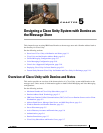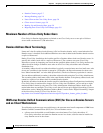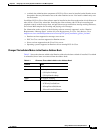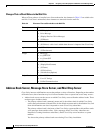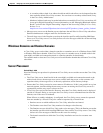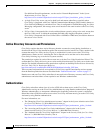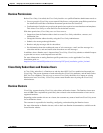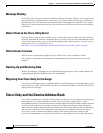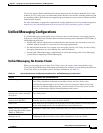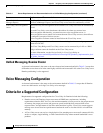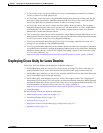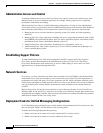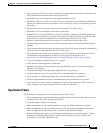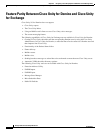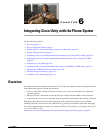
5-8
Design Guide for Cisco Unity Release 5.x
OL-14619-01
Chapter 5 Designing a Cisco Unity System with Domino as the Message Store
Cisco Unity and the Domino Address Book
Message Routing
Cisco Unity voice messages are routed to Domino mailboxes by Domino. When a caller leaves a voice
message (whether an outside caller or a subscriber), Cisco
Unity submits the messages to Mail.box on
the mail drop server. The mail drop server determines the routing path to the mail file of the recipient.
When Cisco
Unity has given the message to the mail drop server, the Domino services are responsible
for delivery.
Notes Client on the Cisco Unity Server
For Cisco Unity to interact with a Domino server, a Notes Client must be installed on the Cisco Unity
server. No other Domino software is installed on the Cisco
Unity server. In order to determine the correct
version of the Notes client to use, see the “Domino Requirements—Message Store” section of System
Requirements for Cisco
Unity Release 5.0 at
http://www.cisco.com/en/US/products/sw/voicesw/ps2237/prod_installation_guides_list.html.
Client Access Licenses
DUC for Cisco is automatically shipped by Cisco with all Cisco Unity for Domino systems.
The customer is responsible for purchasing and maintaining any other Lotus licenses that may be
required.
Backing Up and Restoring Data
Backing up mailboxes is important in any Unified Messaging deployment. The customer should use a
backup program qualified by IBM Lotus for use with Domino.
Migrating from Cisco Unity for Exchange
Cisco Unity for Exchange systems, configured either for Voice Messaging or Unified Messaging, can be
converted to Cisco
Unity 5.0 for Domino, but only by reinstalling all software, and losing Cisco Unity
settings and voice messages.
Cisco Unity and the Domino Address Book
Cisco Unity for Domino uses a Domino address book as its directory service. However, the majority of
information on Cisco
Unity subscribers and other Cisco Unity objects appears only in a SQL
Server/MSDE database. For the small amount of data that appears both in the Domino address book and
in the Cisco
Unity database (for example, extension), Cisco Unity periodically checks the Domino
address book for changes and replicates those changes in the Cisco
Unity database. Some of the changes
that are made in the Cisco
Unity Administrator are replicated to the Domino address book. After a
Cisco
Unity system is installed and running, changes to the address book and to settings in the
Cisco
Unity Administrator are relatively few in number, so this replication will not hurt performance.




